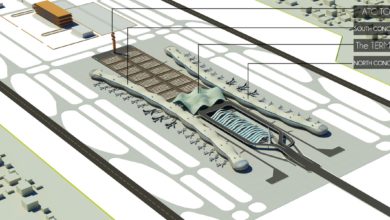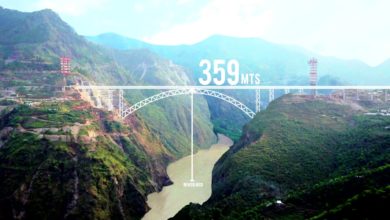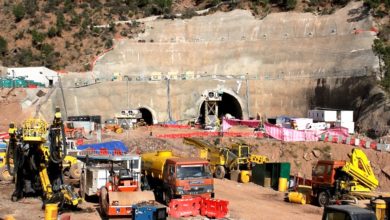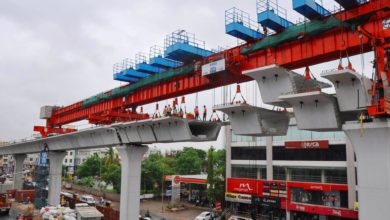ONE OF THE LEADING CONTRACTING ORGANISATIONS ENGAGED IN THE CONSTRUCTION OF PUBLIC INFRASTRUCTURE PROJECTS
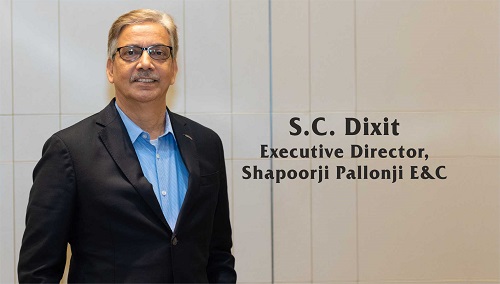
Describe about your business entity in the field of infrastructure and let us know about your expert opinion on the Indian infra market’s current situation.
Shapoorji Pallonji E&C (SP E&C) is one of the leading contracting organisations in India engaged in the construction of public infrastructure projects of national importance. These include construction of airport terminals, convention centers, educational institutes, healthcare facilities, urban transport infrastructure, affordable housing, urban utility infrastructure, etc.
Apart from government projects, Shapoorji Pallonji E&C is also the Construction Contractor for many projects in the private sector & Some of SP E&C’s ongoing infrastructure projects. The combined value of our ongoing projects is to the tune of INR 55,000 Crore.
Besides SP E&C, our group company Afcons Infrastructure has a portfolio of extremely challenging and complex infrastructure projects in India that includes roads and highways, bridges, metro rail, ports, jetties, harbours, tunnels, etc. Sterling & Wilson, another SP Group company, is a leading player in solar power plants, cogen power plants, data centers, MEP Services, etc.
While India is investing heavily in new infrastructure creation, many infrastructure projects are synonymous with serious time and cost overruns. The infrastructure development in India is prone to dependency on external factors (land, environment, socio-economic, community, regulatory, market forces etc.) and has its fair set of challenges. While there may have been a few success stories like the Delhi Metro, but as a whole, our performance falls short significantly, and on a consistent basis.
As of mid-July 2020, the labour strength at our projects is slowly but surely going up, thanks to relentless efforts by our labour mobilisation teams. We are currently operating at 30-50% of our original labour strength on various projects. This includes government projects as well as private sector projects. All kinds of construction projects from Real estate sector to infrastructure projects are back in operation. The supply chain for bulk construction materials is also getting restored.
What are your latest successful projects in infrastructure sector; what are your recent achievements for completing your pipeline projects?
As a construction partner, SP E&C has played a pivotal role in the creation of public infrastructure in India while associating with Central and state government undertakings, PSUs and quasi-government bodies. Some of our recently completed
include :- Healthcare Sector,Education Sector,Government Office Buildings,Museums, Residential,Sports Infrastructure.
Besides government-funded infrastructure projects, SP E&C has a major portfolio of projects in the private sector and has many prestigious buildings and factories projects to its credit.
We has been using new technologies into its projects, across all project phases like, design, preconstruction, construction, and operations and management. In the construction phase, on-site execution, team collaboration, and back-office integration are being reimagined with the use of such digital solutions.
we is amongst the leading Indian companies using new building systems and construction techniques viz., precast construction, modular formwork systems, shear-wall monolithic construction, pre-engineered structural steel construction, top-down construction, etc. These have been ably demonstrated at many of our projects.
Tell us about the growth challenges which the overall infrastructure industry is facing progressively for the year 2020; and what is your positive strategy to combat the crisis of labour to finance for your business plans?
Even before COVID, the construction contracting fraternity was already reeling under severe financial stress from the last 3-4 years. The liquidity constraints being faced by all construction companies and their supply chain have crippled their execution ability. The financial stress upon the Construction sector is expected to worsen over the coming year. The contracting companies continue to be burdened with onerous clauses in contracts. Many government contracts involve contractual risks that are far higher than the margins that can possibly be earned through efficient projects execution. Companies are required to furnish bank guarantees from 15% to as high as 30% of the contract value. The project execution itself is dependent on many key decisions and approvals that need to come from the Employer or the Authority’s Engineer.
Most companies have already represented to their clients – both government and private – to help ease the situation by expediting release of payments towards certified bills, arbitration awards, retention releases, etc., and also by considering additional advances. These payments can then be channelised by the companies to their supply chain. This would be very crucial for recovery efforts post-lockdown.
Primarily, in what manner do you think the government of India is supportive of developing the infra sector in order to channelize the gradually sleeping GDP and bring back some light of hope and enlightenment for boosting demands in the market; especially, talk about your field and the ray of sunshine you see to manage your business?
The GoI, over the last few years, has implemented numerous legislative and procedural reforms. India’s now stands at #63 in the World Bank’s Ease of Doing Business Rankings 2020, up from #142 in 2014. This is a testament of a more seamless and efficient process of procuring construction permits.
The Government has facilitated in debottlenecking critical infrastructure-sector projects, especially in the roads, metro rail and aviation sectors. Such initiatives have been successful to an extent, in easing out some of the core issues such as land acquisition and regulatory approvals. In addition, NITI Aayog has recommended implementing model agreements for improving contractor procurement, which advocate adopting EPC contracting, incentivizing contractors for early project completion, and stage payments that can potentially align the interest of both clients and contractors to the project and reduce the number of claims.
The current regime has also introduced GST and other reforms like the IBC Code, which are expected to boost growth in the long term.
What is it that you forecast for the period of 2020-2022? Do you think that the Indian market can plan out an exit from the challenges and draw some intensive successful movements for doing business activities?
Over the next couple of years, the government is expected to continue investments in the infrastructure sector. Both central and state governments are taking proactive steps to stimulate the economy and attract investments across sectors. The contracting fraternity in India is gearing up for the “new normal” post COVID-19. This level of interest amongst key stakeholders augurs well for the upcoming infrastructure projects.
SP E&C is looking forward to participating in upcoming government tenders for educational institutions, healthcare facilities, airports, urban transport infrastructure, government offices, affordable housing, smart cities, water and wastewater treatment, water supply and sanitation, etc. These are the segments of interest to us.
Despite COVID, India’s resilient economic fundamentals and the ongoing reforms agenda make it attractive for foreign investors. It is also owing to the country’s policy actions, sustained focus on innovation, continued fiscal consolidation and an anti-inflationary monetary policy that it continues to move towards macroeconomic stability. While this is an exciting time for the country, it also presents a different set of challenge for the nation’s infrastructure, which is to grow at an extraordinary pace and support the economic activities as a growth catalyst.
What expectations you have from the government’s plans and reforms?
The success of infrastructure projects is dependent on multiple factors. The main issues that Contractors like us grapple with are lack of comprehensive upfront planning and risk management, poor scoping, unrealistic budgets, lopsided competition, poor collaboration across stakeholders, delays/uncertainties in decision making process and regulatory approvals, delayed payments, inadequate dispute resolution mechanisms, and above all, lower maturity of project management processes to adequately plan for such factors. If these issues are addressed, it will facilitate growth of social infrastructure including education, health, housing, water supply, sanitation, sewage disposal, and have a direct impact on the quality of life of India’s citizens.
The government needs to recognize Contractors as important stakeholders who can transform the government’s infrastructure vision into concrete realities. The government can derive immense economic benefits through adoption of standardized and equitable contracts, relaxed payment terms, rationalised contractual risk structure and reasonable bank guarantee requirements. These measures can revive the construction sector, generate massive employment and thus result in a multiplying effect on the national economy.
Is there is something you would like to share with your audience at large, as in discussing your trade principals and motives?
For India to become a developed nation, the successful implementation of public infrastructure projects is imperative. This requires various stakeholders including key ministries, nodal GoI think tanks and key state undertakings that are implementing these projects, engineering and contracting firms in the country, to address and adequately respond to the challenges. These stakeholders need to organize themselves by adopting best practices in risk management, project governance, procurement and contract management. These stakeholders also need to optimize their project management processes to achieve on-time and within-budget performances.



